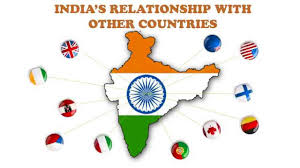
Foreign Relations and Indian Constitution.
Source: Yojana April 2020
Foreign Relations and Indian Constitution.
Globalisation has resulted in the widening and deepening of systemic interdependencies amongst nations. However, the ideal of just world order will not be realised without adherence to international rule of law. This goal necessitates finding common approaches to counter problems of terrorism, human rights, environmental degradation, international trade and utilisation of natural resources beyond national jurisdiction. Therefore, the sovereign States are actively participating in international negotiations for framing of treaties at international, regional and subregional levels. The Constitution of India lays down clearly the bases on which foreign policy should be framed and respected. The basic thrust of Article 51 is to maintain international peace and security, international relations and international obligations, matters which, under the Indian Constitution, fall exclusively within the domain of the Union.
- Under the Constitution, the constituent units of the Indian Union do not enjoy any international standing.
- Although this Article falls in the Part IV of the Constitution which is non-justiciable, nonetheless, it occupies an important position in the determination policy in India.
- In reality, Article 51(c) does not deal with the enforcement of treaties, it only obligates the State to foster respect for “international law and treaty obligations” in interstate relations.
- The treaties are not self-executing in India and to make a treaty enforceable in the court, the Parliament has to adopt legislation under the Article 253 of the Constitution.
Indian Judiciary and International Law
- Obligations arising from treaties are not judicially enforceable in India unless backed by legislation.
- Nevertheless, a number of judgments have shown that there is no need to incorporate a treaty into law if its implementation is possible at the administrative level and without legislative endorsement.
- The provisions of the international treaties were invoked in Courts for the purpose of interpreting the domestic law.
- The Maneka Gandhi decision gave a new direction to human rights jurisprudence. It laid down that not merely should there be procedure established by law, but the procedure itself must also be reasonable, fair and just, otherwise the law would be violative of Article 21.
- The Supreme Court has time and again made it clear that the rules of international law must be incorporated into the national law, even without legislation, provided they do not conflict with acts of Parliament.
- When they did conflict, the sovereignty and integrity of the Republic and the supremacy of the constituted legislatures in making the laws could not be subjected to external rules.
- Relying upon Articles 14,15,19(1)(g) of the Constitution, the court observed that “any international convention not inconsistent with the fundamental rights and in harmony with this spirit must be read into these provisions to enlarge the meaning and content thereof to promote the object of the constitutional guarantee”.
Conclusion:
Article 51 of the Constitution brought good name and respect for the country by the international community and also helped in strengthening to espouse the causes of developing nations before international organisations.
